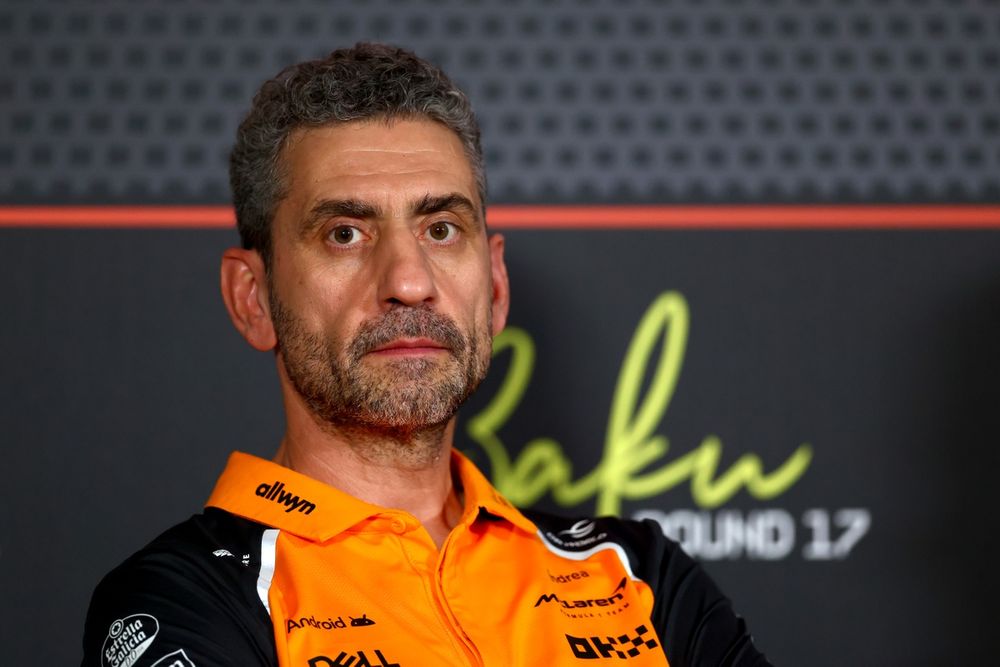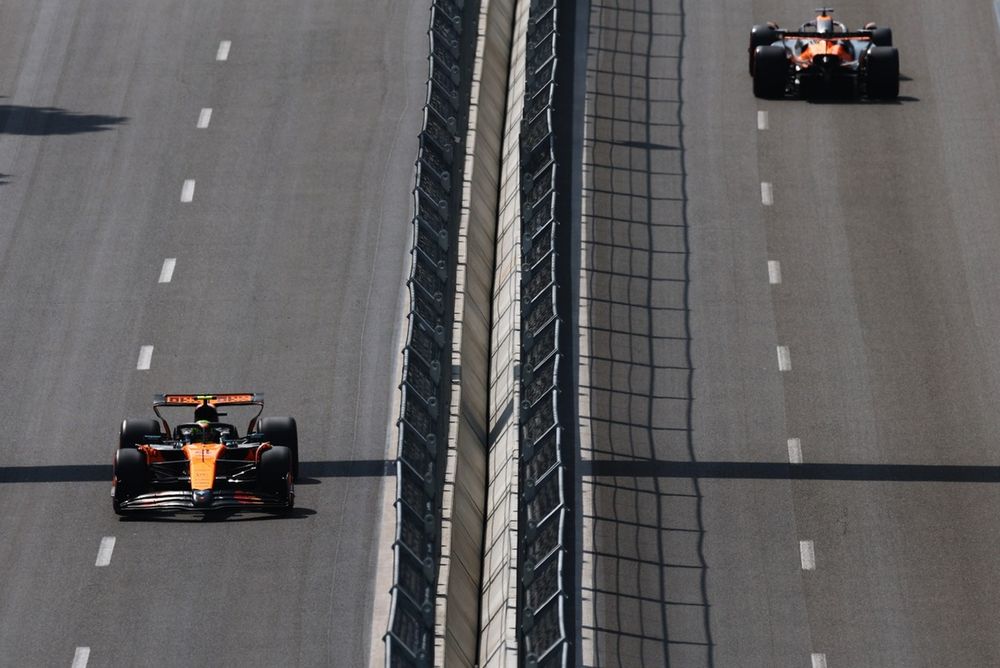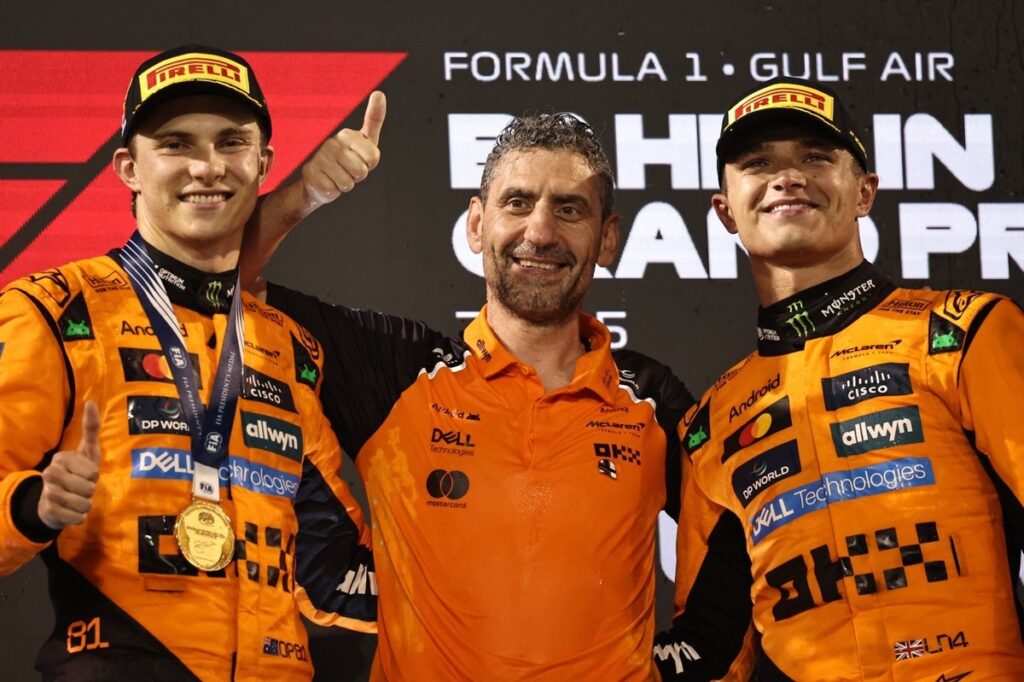There is a fascinating comparison to be had between the current furore over stage management in Formula 1 and two notorious examples from the past.
Why? Because Andrea Stella is a common denominator in all three. The McLaren team principal was Fernando Alonso’s race engineer in 2010 when Alonso’s Ferrari team-mate, Felipe Massa, was told “Fernando is faster than you”, a (lightly) coded message to move over, in the German Grand Prix.
Team orders such as these were illegal at the time because of events eight years earlier. Stella was Michael Schumacher’s performance engineer at the infamous 2002 Austrian Grand Prix, when Rubens Barrichello was ordered to cede the lead to his team-mate, doing so with embarrassing prominence on the final lap.
He might have been a non-speaking member of the cast in these historic examples, but Stella will have witnessed first-hand the complexities of these situations. In both – arguably less so in Austria, since it was near the beginning of the season – there were pressing reasons of competitive advantage for ‘putting a finger on the scales’ and manipulating the outcome.
There was more to these events than met the eye, too. But in terms of what was visible, inarguably the optics were poor and Ferrari bungled the handling of them, acting with sheer bloody-minded arrogance.
In 2002, even as Schumacher was being booed on the podium, team principal Jean Todt assumed a demeanour of po-faced hauteur, squinting down his nose at any interlocutors. Smugness emanated from him like a sickening miasma: not only what I did was perfectly justified, he seemed to be saying, but you’re a moron for even daring to question it.
Michael Schumacher, 1st position, Rubens Barrichello, 2nd position, and Juan Pablo Montoya, 3rd position, on the podium.
Photo by: Motorsport Images
The FIA fined Ferrari, Schumacher and Barrichello the joint sum of $1million, half to be paid immediately, the rest suspended, and the Scuderia tossed the cash in the governing body’s lap with the studied nonchalance of one handing a waiter a derisory tip. In contrast to his later and rather more thin-skinned tenure as president of the governing body, Todt palpably didn’t give a tinker’s cuss what anybody thought of him provided he brought the world championships to Maranello.
Did the young Andrea Stella learn from the confounded arrogance of this and the subsequent team-orders chicanery at Hockenheim, when once again – with different faces at the helm – the shutters were slammed down once more against all criticism? It appears so because Stella’s responses to comments about McLaren’s approach to managing its drivers have been measured and statesmanlike.
“I think noise around racing situations is natural,” he said in Baku. “Formula 1 is a very popular sport. What’s important for us is that comments are respectful.
“And when they are respectful, we welcome them, we listen, we take them into account – even if ultimately what counts for us is not the external noise, but what we make of it internally and how we set ourselves to keep going racing.”
Characterising the conversation surrounding how McLaren manages its drivers as “external noise” may cause some to chafe, but Stella is not wrong, since a good proportion of the commentary has been noisy indeed. But the optics of the situation are very different depending on whether you’re inside or outside the tent.
So far as the team is concerned – the tinfoil hat brigade may not agree – this is not a situation where race outcomes are being manipulated to favour a nominated ‘number one’ driver over a not-always-compliant number two (it’s often overlooked that in Austria in 2002, the ‘Schumacher wins’ scenario had been discussed and agreed the night before the race, but Barrichello then changed his mind and threw a tantrum about it when he found himself in the lead).

Andrea Stella, McLaren
Photo by: Bryn Lennon / Formula 1 / Getty Images
McLaren has, thankfully, parked the “papaya rules” terminology surrounding its internal rules of engagement, but the principles remain clear – perhaps even more so than last year. Last year Oscar Piastri suffered a rush of blood to the head at Monza and mugged team-mate Lando Norris for the lead shortly after the start – a move which ultimately cost McLaren a race win and harmed Norris’s diminishing chances of challenging Max Verstappen for the world championship.
This season McLaren has been more open in orchestrating its drivers when it feels fairness demands it, most recently in Monza, where Piastri pitted first to avoid a potential threat from Charles Leclerc’s Ferrari, but a blunder during Norris’s subsequent stop reversed the order of the two McLarens. This put the team in an invidious position: do nothing, and it would feed fruit-loop conspiracy theories that it was favouring Piastri over Norris; swap them back around and it would – ah yes, feed another strand of similarly demented beliefs.
When the team issued the instruction to swap places on track, it’s noteworthy that Piastri’s only pushback (on broadcast channels at least) was an oblique reference to whether this was one of the pre-agreed scenarios within McLaren’s rules of engagement.
Outwardly at least, then, Stella’s vision is working: he doesn’t want a Senna/Prost, Hamilton/Rosberg scenario on his hands as he steers McLaren through the major rules reset coming next year.
“The way we go racing is dependent on the racing principles,” he said. “On the values that we embody as McLaren Racing, and also is a reflection of the fact that we want to protect the unity of the team, which is a foundational condition for the future.
“Like I said before, racing situations are definitely susceptible to different interpretations. So we are comfortable with the noise, with the comments. We welcome the comments. Like I said before, what’s important is that they always remain respectful. Respect is a very important value for McLaren Racing, and I’m sure for everyone.

Lando Norris, McLaren, Oscar Piastri, McLaren
Photo by: Clive Rose / Getty Images
“So, no surprise around the noise. From the pitwall, we execute what we agree with our drivers, which ultimately becomes our racing principles and approach.
“In that situation, like I explained after the [Monza] race, and like I think Lando and Oscar have explained yesterday – because we sequenced the two cars in a certain way at the pitstop, going with the car behind – then we required a swap.
“This compounded with the slow stop led to a swap. But the situation that we had with the sequence in terms of strategy is the same as Hungary, and we acted consistently with the situation we had in Hungary.”
In this he is referring to last year’s Hungarian Grand Prix, where Norris was running behind Piastri on track but pitted first during the second round of stops to protect against a threat from Lewis Hamilton. Strong out-laps then enabled Norris to undercut his team-mate and he was prevailed upon to let Piastri past.
So McLaren feels it is doing nothing wrong. But the perception outside the tent is very different: setting aside the skewed optics of those who have strong opinions about one driver or another, there is a widespread feeling that the ‘racing principles’ represent orchestration by any other name.
McLaren, so certain that it is doing the right thing by its drivers, simply feels the wider world of F1 fandom doesn’t ‘get it’.
But at least, unlike the pomposity and conceit of Todt circa 2002, it’s willing to hold a conversation on the matter and acknowledge opposing points of view.
Read the full article here

